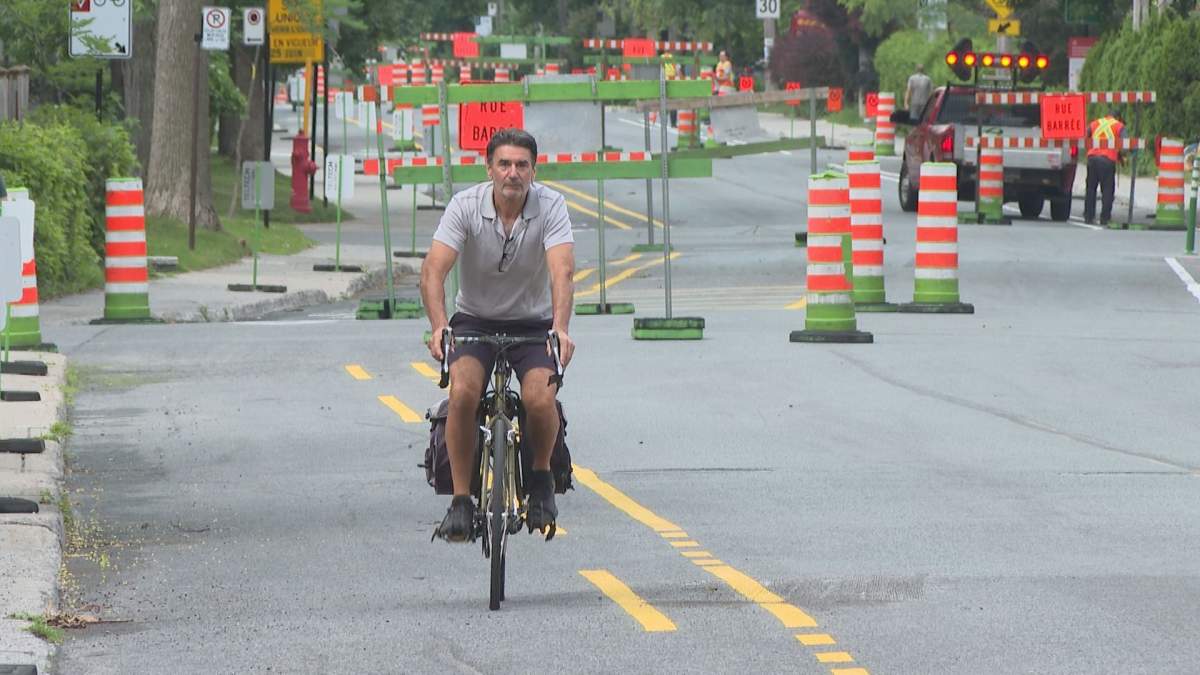In Montreal, a group of residents is trying to hit the brakes on new bike lanes and threatening to sue the city over how it handles setting up its growing cycling network.

Marc Perez of the Coalition for Democracy Montreal claims “the city has decided not to listen to its people” when it comes to how bike paths are executed.
“So far I have never met anyone who is anti-bike path — nobody,” Perez said in an interview Monday. “Everyone is against the way the policies are being implemented and that is the biggest concern.”
The group insists Montreal Mayor Valérie Plante’s administration needs to better consult residents before building new bike paths. The move comes as debate continues over changes in the city’s Parc-Extension area and an overhaul of Terrebonne Street in Notre-Dame-de-Grâce, a neighbourhood in Montreal’s west end.
In NDG, Terrebonne Street gained two bike lanes last summer. As a result, more than 300 parking spaces were removed from the street. Opinions have been split on the revamp, but Perez says residents wanted a configuration that works like in other neighbourhoods.
“Parking was kept, bike paths were implemented. That’s what we want. What the mayor decided for this street is completely the opposite,” he said.
Perez says the changes on Terrebonne Street have so far been problematic: there is less parking access for a local school and church and there is more double parking and cars spilling onto neighbouring roads.
“In the morning there is major traffic. It’s all backed up so they just go to the other streets,” Perez said.

Get daily National news
The Coalition for Democracy Montreal plans on filing a lawsuit against the city, alleging that Montreal is forcing too many bike paths without taking into consideration the opinions of residents in those neighbourhoods.
But the city counters that it undertakes extensive consultation before installing new bike paths. The expansion of Montreal’s cycling network — which stretched more than 900 kilometres as of May 2023 — has been a priority for Plante since she took office in 2017. This includes the Réseau express vélo, a 191-kilometre lattice of protected bike lanes through some of Montreal’s densest neighbourhoods.
Marianne Giguère, a city councillor in the Plateau-Mont-Royal borough and the executive committee member for active mobility, says prioritizing a “good cycling infrastructure” is “something we have always been clear about.”
“We want to provide people with good mobility options. This is what we promised to the citizens and they voted for us,” Giguère said. “We’re just giving them what we promised, what we say we will do.”
In Montreal, Giguère says about 1.3 per cent of street surfaces are dedicated to bicycle infrastructure. She says she understands change can be hard, but the city “wants to build the best infrastructure possible” across different boroughs, especially in areas traditionally underserved by viable active transit options.
“We need to adapt, we need to provide options. We need to adapt to the climate crisis also and this is one of the tools that we have,” Giguère said.
Pro-cycling groups agree, saying cycling is a solution in dense areas with too many cars and vehicular traffic.
“I think we need more bike paths in Montreal to connect all the neighbourhoods. The bike path is about giving people mobility options,” Vélo Québec president Jean-François Rheault said.

Giguère, for her part, notes there will always be two sides when it comes to implementing new bike paths. She counters she has also heard from residents who insist “it’s not enough, it’s not going fast enough for active mobility.”
As for the possible legal action, Giguère says residents have a “right to do so.” The city will respond to the lawsuit if and when it’s filed, she added.
Meanwhile, Perez of the Coalition for Democracy Montreal is calling on the city’s administration to “sit down with an urban planner with the citizens.”
“I want them to take into consideration what the citizens are proposing because there’s nobody better to propose anything better for their neighbourhood than the people that actually live here,” he said.
—With files from Global’s Brayden Jagger Haines and The Canadian Press




Comments